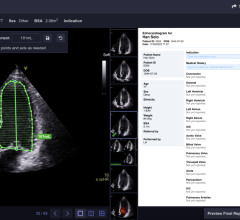
March 3, 2016 — Philips announced four leading U.S. health systems have signed multi-year telehealth deals to implement the company’s remote intensive care unit (eICU) program. These new population health management engagements include agreements with Westchester Medical Center Health Network (WMCHealth in New York), Baptist Memorial Health Care (Tennessee) and BJC HealthCare (Missouri).
The conditions of ICU patients can deteriorate rapidly. The eICU program's telehealth team of remote specialists continuously monitor patients to support the bedside team and proactively identify issues and intervene before they become significant problems. The eICU telehealth team has access to Philips’ advanced analytics that can process large amounts of data from more than 150 patients, along with data visualization tools that allow clinicians to focus on those patients who need their attention first.
"Ensuring the best care possible for patients takes on a new meaning when their condition is critical," said Corey Scurlock, M.D., medical director for the Westchester Medical Center Health Network's eHealth Center. "While our on-site staff is exceptionally capable, the additional support that a specialized telehealth program like Philips offers empowers us to oversee a larger population and have a deeper insight into those at the greatest risk of needing intervention immediately."
Ultimately, this type of proactive care can help improve clinical and financial outcomes. Compared to patients receiving usual ICU care, patients who received ICU care from a hospital with an eICU program were 26 percent more likely to survive and discharged from the ICU 20 percent faster. Additionally, on average, tele-ICUs result in $5,000 in cost savings per patient and 1.2 million in savings due to reduced transfers.
As the population in the United States ages, demand for critical care is rising at a time when the industry is facing a chronic shortage of intensivists. According to The Journal of the American Medical Association, the intensivist shortage will become increasingly challenging, with supply meeting only 22 percent of the demand for services by 2020. Consequently, ICU patients are often cared for by non-specialists. Telehealth enables intensivists to cover wider geographies and provide access to care to more people, while patients stay in their local hospitals. This helps them avoid both transportation costs and the stress of transferring to other critical care centers, while still giving them access to the specialized care they need.
The Philips eICU program is part of a suite of enterprise telehealth solutions delivered by Philips Hospital to Home to help improve outcomes, provide better value and expand access to care. These programs help address multiple cohorts within a population ranging from highest cost patients with intensive ambulatory care and acute needs, to discharge transition and chronic patient management, to prevention and wellness for the general population. These programs use a proactive care model to clinically transform the delivery of care to address growing clinician shortages while improving patient outcomes.
For more information: www.philips.com


 May 30, 2023
May 30, 2023 








